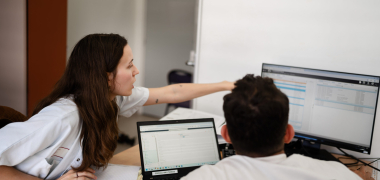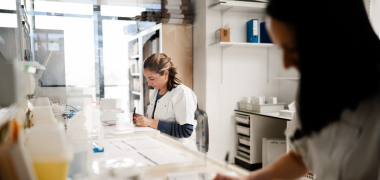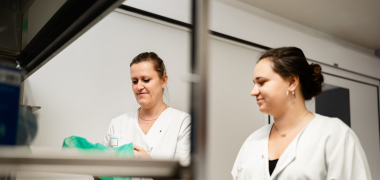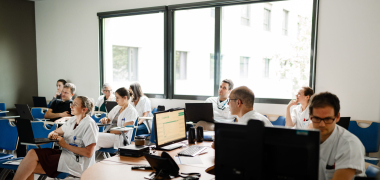Working in research
Working in research within IRCCS is the opportunity to offer patients the drugs and therapeutic strategies of tomorrow.
Working within IRCCS
Innovation
Autonomy & versatility
Team involved
Our values

Mixedness within our association constitutes a fundamental value which enriches our daily work. By bringing together people from diverse backgrounds, we create an inclusive environment conducive to creativity and innovation.
Every individual, whatever their background, has the opportunity to contribute and thrive. We are committed to providing equal opportunities for development and success to all our employees, without discrimination.
We adopt a zero tolerance policy towards discrimination and harassment in all its forms. We are committed to creating a respectful work environment, where every individual feels safe, valued and free to express themselves.
We value the flexibility of working time, allowing everyone to adapt their schedule according to their personal and professional needs. This approach promotes a better work-life balance, while supporting the engagement and productivity of our employees.
Overall satisfaction rate of our employees: 95%
Our professions

A clinical research associate (CRA) is a professional specialized in the management and coordination of clinical trials. Clinical trials are studies conducted to evaluate the effectiveness and safety of new treatments, drugs, medical devices or therapeutic interventions before they are placed on the market.

The role of the biological sample management technician is to prepare samples (blood, tissues, etc.) from patients suffering from hematologic malignancies so that they can be sent and then analyzed by a reference laboratory chosen by the sponsor (centralized laboratory) . He has a transversal role by collaborating with CRAs and healthcare staff (doctors and nurses) on several clinical trials.

Pivotal in the care of patients in the department’s clinical trials, study nurses are the direct referents of patients. They administer treatments according to protocol prerequisites and are present at each visit.

The sector project manager supervises clinical research studies in his/her sector of activity, optimizes the distribution of tasks, and collaborates with the clinical research manager to guarantee the smooth running of the trials.

Data manager ensures data management throughout the life cycle of a study, guaranteeing their quality, integrity and security.
Biostatistician plays a key role in the design, analysis and interpretation of scientific data, particularly in the fields of medical research.

Head of the clinical research department, using his/her scientific and medical expertise, develops, coordinates and implements the opening of IRCCS clinical studies in coordination with health professionals, ensuring compliance with the regulations and deadlines.

Clinico-biological project manager has a transversal and strategic role, combining scientific, logistical and administrative responsibilities, while being oriented towards results and innovation. His/her role leans on a wide range of skills, from scientific expertise to scientific expertise, operational logistics, and strategic communication.

The role of the overcost project manager is to negotiate clinical research contracts and additional costs for external projects (industrial and academic) in the lymphoid and myeloid sectors.

Administrative and financial manager supervises a portfolio of hematology-related associations, overseeing financial, accounting, tax, analytical, administrative and HR aspects.

Accounting secretary is in charge of the administrative and accounting management of several associations linked to hematology.
